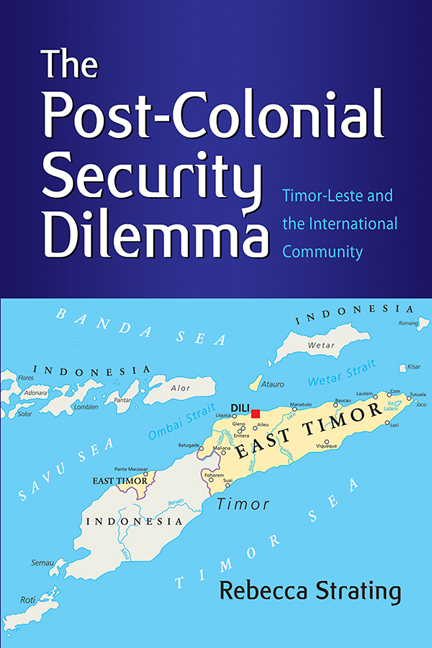Book contents
- Frontmatter
- Contents
- List of Tables
- Acknowledgements
- 1 Introduction
- 2 The Struggle for Recognition: Territorialization, Self-determination and the Imagining of “East Timor”
- 3 The Politics of Recognition: East Timor and the International Community
- 4 Establishing Legitimacy: International State-building in East Timor
- 5 Timor-Leste's Aspirational Foreign Policy
- 6 Identity Hedging: Timor-Leste's Engagement with Intergovernmental Organizations
- 7 Timor-Leste's National Security Agenda
- 8 Securing Economic Sovereignty
- 9 International Reconciliation and Transitional Justice
- 10 Conclusion: Timor-Leste in the Changing Regional Order
- Postscript
- Bibliography
- Index
- About the Author
5 - Timor-Leste's Aspirational Foreign Policy
Published online by Cambridge University Press: 16 May 2019
- Frontmatter
- Contents
- List of Tables
- Acknowledgements
- 1 Introduction
- 2 The Struggle for Recognition: Territorialization, Self-determination and the Imagining of “East Timor”
- 3 The Politics of Recognition: East Timor and the International Community
- 4 Establishing Legitimacy: International State-building in East Timor
- 5 Timor-Leste's Aspirational Foreign Policy
- 6 Identity Hedging: Timor-Leste's Engagement with Intergovernmental Organizations
- 7 Timor-Leste's National Security Agenda
- 8 Securing Economic Sovereignty
- 9 International Reconciliation and Transitional Justice
- 10 Conclusion: Timor-Leste in the Changing Regional Order
- Postscript
- Bibliography
- Index
- About the Author
Summary
Since becoming a new state in 2002, Timor-Leste's foreign policy approach has been driven by the twin demands of guaranteeing survival and asserting political independence. Particular insecurities and constraints arise from being a small power. The “post-colonial security dilemma” reflects the need for small, new, weak states to diminish their reliance upon other states by pursuing a concept of absolute external state sovereignty as “real” independence. The tensions between dependence and independence are reflected in Timor-Leste's efforts to secure state sovereignty through its international relations, national defence policy and development strategy. This book argues that the historical experiences of the denial of self-determination and international state-building outlined in the previous chapters helped shape Timor-Leste's foreign policy approach, threat perceptions and subsequent engagements with the international community. Perhaps the greatest limitation is its inability to independently guarantee its own security. Small states are limited by what they can achieve in their international relations and have few opportunities to shape the international structures they inhabit. Like most small, new states, Timor-Leste's core national interest is survival, and it must use foreign policy as a way of negotiating its vulnerabilities and insecurities. Yet, even the smallest and weakest states have options in pursuing core national interests. The question is how small states can maximize their capacity for strategic manoeuvring and decrease reliance on relationships that give rise to imperatives rather than choices.
This chapter examines the formation of Timor-Leste's foreign policy. The initial challenges were determining its place in the world and defining its strategic national interests. Three key objectives have driven Timor-Leste's international relations:
1. Develop good relations with states in the region, particularly Australia and Indonesia;
2. Pursue membership of regional and international organizations;
3. Establish relationships with those beyond the immediate neighbourhood.
Timor-Leste's foreign policy objectives emphasize a collaborative and cooperative approach to international relations in support of the key interest of survival. Initially, Timor-Leste's foreign policy was designed to support nation-building goals. Xanana Gusmão, for example, argued that “Timor-Leste is not only a small country; we are also the youngest nation in the Asia Pacific. Precisely because we are small, and because we are young, it is important that we work together with our neighbours to improve the lives of our people and the human development of our region.”
- Type
- Chapter
- Information
- The Post-Colonial Security DilemmaTimor-Leste and the International Community, pp. 123 - 160Publisher: ISEAS–Yusof Ishak InstitutePrint publication year: 2018

